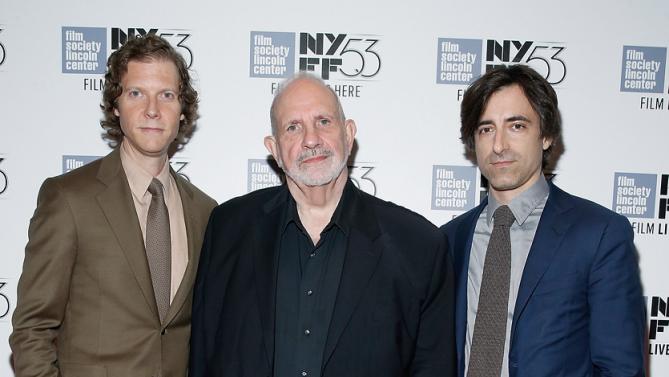
Photo by John Lamparski/Getty Images, posted at Yahoo News
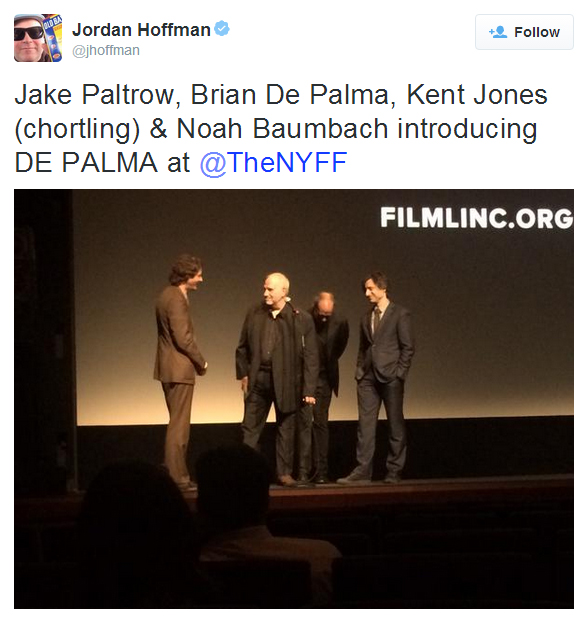
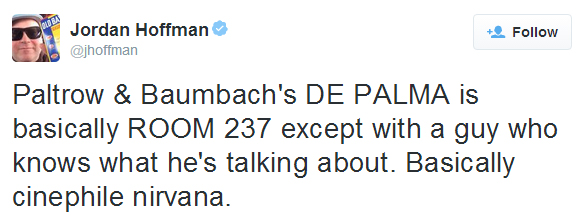

Updated: Wednesday, September 30, 2015 9:43 PM CDT
Post Comment | View Comments (1) | Permalink | Share This Post
 Hello and welcome to the unofficial Brian De Palma website. Here is the latest news: |
|---|
E-mail
Geoffsongs@aol.com
-------------
Recent Headlines
a la Mod:
Listen to
Donaggio's full score
for Domino online
De Palma/Lehman
rapport at work
in Snakes
De Palma/Lehman
next novel is Terry
De Palma developing
Catch And Kill,
"a horror movie
based on real things
that have happened
in the news"
Supercut video
of De Palma's films
edited by Carl Rodrigue
Washington Post
review of Keesey book
-------------
Exclusive Passion
Interviews:
Brian De Palma
Karoline Herfurth
Leila Rozario
------------
------------
| « | September 2015 | » | ||||
| S | M | T | W | T | F | S |
| 1 | 2 | 3 | 4 | 5 | ||
| 6 | 7 | 8 | 9 | 10 | 11 | 12 |
| 13 | 14 | 15 | 16 | 17 | 18 | 19 |
| 20 | 21 | 22 | 23 | 24 | 25 | 26 |
| 27 | 28 | 29 | 30 | |||
De Palma interviewed
in Paris 2002
De Palma discusses
The Black Dahlia 2006

Enthusiasms...
Alfred Hitchcock
The Master Of Suspense
Sergio Leone
and the Infield
Fly Rule
The Filmmaker Who
Came In From The Cold
Jim Emerson on
Greetings & Hi, Mom!
Scarface: Make Way
For The Bad Guy
Deborah Shelton
Official Web Site
Welcome to the
Offices of Death Records




"I saw the first-rate Noah Baumbach-Jake Paltrow documentary De Palma which unfolds as a virtually nonstop monologue by the filmmaker directly addressing the camera – and the audience – as he sits in what looks like his Fifth Avenue apartment. In chronological order Brian De Palma, now basically retired and a longtime mentor and friend to the two filmmakers, discusses every one of his films, interjected with what seems almost a stream of consciousness various clips of his movies – from the earliest student days with an unknown Robert De Niro to CARRIE, BLOW OUT, THE UNTOUCHABLES, BONFIRE OF THE VANITIES and MISSION: IMPOSSIBLE -- and to those many films he references which, yes, are mostly Hitchcock’s films. It’s a delicious immersion, often funny and enticing enough to make you want to go back and plunge into DePalma’s often violently grotesque landscapes again (or for the first time)."
"This is my fourth year covering the New York Film Festival, and one of my fondest festival memories, oddly enough, is seeing Brian De Palma’s Passion back in 2012. Hardly anyone would dare call it one of De Palma’s best; at very least, the blood isn’t richly liquid enough, and if you want to get more detailed, you might point out that the entire first half is kind of stilted and alien-sounding. But despite that tininess the whole audience seemed to identify it early on as a De Palma retro palate cleanser a la Raising Cain and Femme Fatale, and what at other screenings might have been mistaken for unintended laughter sounded, to me, like a collective acknowledgment of the very film-crit pleasures in observing a master filmmaker play around with his favorite tropes ('I didn’t know you had a twin' is not a laugh line, but it plays like a knowing joke to the De Palma faithful)."It’s appropriate, then, that my first NYFF screening this year was De Palma, a documentary by Noah Baumbach and Jake Paltrow that parlays their friendship with the director into a career overview.
"These kinds of docs are not uncommon, though they tend to run on PBS or HBO; Richard Linklater had one just last year with 21 Years, an affable look at his filmography that played a bit like a promo piece for Boyhood. But De Palma, culled from thirty to forty hours of conversations and pruned to only include De Palma’s voice, not his interviewers’, is more comprehensive and film-buffier than most. This is a full run-down covering every single movie he’s directed; Passion (which, sadly, remains his most recent fiction feature as of this writing) is the only one he doesn’t address directly, because the footage was filmed about five years ago, before that film was complete (Baumbach and Paltrow do include clips, though, as De Palma finishes up talking about how he’s returning to smaller indies after decades in and out of the studio system). If you’ve ever wanted to hear De Palma talk about Bonfire of the Vanities or Mission to Mars or Raising Cain alongside Blow Out and Dressed to Kill, this is your movie. And this is definitely my movie."
"But the doc transcends mere film-buff details for a fascinating, slowly emerging portrait of a pigheaded provocateur, maybe somewhere on the spectrum. Why did Body Double’s murder weapon, a model-impaling power drill, have to be so long and phallic? That’s only logical, of course: 'It had to go through the floor too.' Why does De Palma’s camera chase so many leggy female victims? 'I'd rather be following around a girl than a guy.' Why did his marriages end? 'My true wife is my movie, not you.' De Palma’s straightforwardness is often exhilaratingly impolitic."Even more absorbing than this defensiveness, though, is De Palma’s obvious fury at defeats that still sting. Cursed with a razor-sharp memory at age 70 (these interviews were shot in 2010), the director seems to recall every tiny dispute and major war, from arguments with 's script doctor Robert Towne over the ending, to the vast critical dislike for his Hindenberg version of The Bonfire of the Vanities: 'I understood the book perfectly,' he spits, clearly reacting to critical snubs from 25 years ago, while also allowing that it was a disaster.
"It all adds up to an exposure that goes well beyond appraisal, entering into rare realms of frustration, dysfunction, euphoria and cynicism. Baumbach and Paltrow do De Palma's work justice via intelligently selected clips, a string of which—dating from 1974’s Phantom of the Paradise and the now-classic Carrie, to daring ’80s triumphs like Blow Out and Casualties of War—should be a religious experience for fans. But this is hardly a sermon. It's more like confession, the director still seething and replaying Vertigo in his head, lost in the curves of his career. De Palma is a public therapy session that upturns all expectations."
"I’ve always been skeptical of the claims made by the late Pauline Kael and her followers that Brian De Palma is a great director, although I think he’s made a handful of major films. By enabling de Palma himself to speak in an uninterrupted flow, De Palma directors Noah Baumbach and Jake Paltrow allow him to make a case for his body of work, as well as admit the flaws of films like Snake Eyes and Mission to Mars. De Palma races through the director’s life and filmography, juxtaposing an interview (in which Baumbach and Paltrow’s voices are never heard) shot against a plain dark background with plentiful clips from the work of De Palma and other directors."De Palma has been criticized for ripping off other filmmakers, especially Hitchcock, and for misogyny. He openly admits to the former –– in fact, De Palma opens with a clip from Vertigo –– but attributes feminist critiques of Dressed to Kill and Body Double to ‘80s fashion. As De Palma recounts his discovery of his voice and ability to launch a career, the film has a real joy. That largely fades after the ‘80s –– de Palma is honest about the probability that his glory days are behind him. Still, De Palma makes a great case for the merits of films like Carrie and Blow Out and leaves one wishing for a De Palma retro."
"In February of 2014, we dedicated an entire issue here at Cinética to filmmakers who, once names of certain prestige in the business they helped reshape, were now relying on alternative modes of production to keep making films that were smaller, more personal and no less impressive. 'I make movies like you guys now', says Brian De Palma at some point to the directors, about his rediscovered independence. For Baumbach and Paltrow, choosing to make a movie about him is certainly a consequence of an unlikely friendship, but the gesture also carries, even if unintentionally, a genealogical undertone, as the two new indies underline a titan of a long gone industrial ethos that they might want to carry forth in their work. Not only a sophisticated stylist, Brian De Palma is also an embodiment of the history of modern Hollywood, from the challenge of climbing the highest of all cinematic walls (which just happened to be crumbling to dust at the time) from the independent back lot to the major studios, to the laurels and the misery of being eaten alive by the unreliable tides of awards, improbable hits, major box office failures and late critical recognition that just barely got him a spot in contemporary auteristic pantheon. He’s seen it all, and an artist who’s seen it all tends to have stories to tell."That’s when things start getting a little funny in this one sided conversation. When we chose to write about how the sun was setting over a certain Hollywood here at Cinética, De Palma was not only part of this more or less arbitrary group of directors we elected (with the likes of Paul Schrader, John Carpenter, Wes Craven, Abel Ferrara, Joe Dante and Monte Hellman), but was actually the heartbeat at the root of our drive: his latest film, Passion (2012), had then been gravely overlooked by distributors and film festivals alike in Brazil, while modern loves like Baumbach’s own Frances Ha (2012) were received by audiences and young cinephiles and critics with disproportional fanfare. Forcing a connection between the two events is not a path worth taking, but the pages of general taste have been turned and the safety net of the major indies does not set up itself. While there is undeniable beauty in Brian De Palma’s passionate reaction in the film to the way blockbusters are pre-made today, compared to how he made Mission: Impossible (1996) or Mission to Mars (2000), there’s a statement of just as eloquent a silence bubbling under the snippets of Hi, Mom! (1970), Greetings (1968) or Murder à la Mod (1968): there’s very little room, if any, for such displays of cinematic confrontation in the american 'indies' of today.
"This lack of confrontation is just as much part of the choice of a question-less interview as the director’s respectful devotion to their older friend. There are many interesting problems waiting to be uncrumpled in De Palma’s self-narration – the most provocative one involving a source in Redacted (2007), which the movie quickly brushes off, despite the director’s relative serenity in dealing with a major ethical dilemma – but any possibility of taking things one step beyond a mere report is sabotaged by the film’s elegant passivity. In fact, whenever Baumbach and Paltrow risk a more interventional relationship with the material, it leads to awkward, if not downright embarrassing demonstrations of cinematic cluelessness – the illustration of a never made hip hop version of Scarface (1983), for example, is a rare moment when the editing willfully contradicts De Palma’s take on his own history, and one can only be glad it’s such an isolated incident. The fact that the documentary manages to come out relatively unscarred from tabloidian gossip might make it look slightly more serious than Robert B. Weide’s Woody Allen: A Documentary (2012), but it is just as shallow and personality-centered, and just as influenced by the paradigms of news broadcasts and talk shows. Everybody loves anecdotes, and there are certainly some gems here, but the true cinematic reflections are slim and, worse, patiently waiting to be found, excavated and brought up to the surface. 'It’s always the run-up to what happens that is interesting and of course in my movies the run-ups last forever' might be a great open door to De Palma’s mannerist take on hitchcockian grammar, but the movie is happy to keep its doors shut, and let such penchant for self-reflexivity die on the shore in the form of a punchline."
"Filmmaker Brian De Palma is an engrossingly frank talker whose terrifically entertaining movies sometimes take years to accrue the fandom they deserve (Scarface’s cultural impact didn’t peak until about a decade after its release, and the once-reviled Body Double is now remembered fondly by many cinephiles). So a retrospective documentary honoring his work seems overdue, but Noah Baumbach and Jake Paltrow’s De Palma is merely serviceable. Filmed over the course of five days in Paltrow’s living room, the film chronicles De Palma’s movies in order with copious clips over his commentary. That it holds your attention for its entire 107 minutes is testament to the director’s extensive filmography and its magnitude of impeccably composed thrills."Though De Palma occasionally goes deep—at one point, he explains that the basis of Keith Gordon’s Dressed to Kill character came from his teenage spying on his father when he was cheating on De Palma’s mother—he’s not particularly challenged here and is able to, for example, dismiss criticism of his movies’ perceived misogyny with just a few words. He isn’t distastefully arrogant, nor does he flinch when discussing his numerous flops, but I didn’t get the sense that Baumbach and Paltrow were able to extract much more from him than your average interviewer (he was similarly open with me, seemingly willing to take on whatever question I’d throw at him, when I spoke to him by phone a few years ago). Because of its softball-interview nature (aside from a few seconds of him walking down the street, we only see De Palma sitting in Paltrow’s living room), De Palma feels like one of those feature-length docs that ends up stuck on a DVD as a bonus—but a good one."
"Reveries of sensuality and blood-soaked violence mark the work of director Brian De Palma. In a new documentary, the filmmaker recounts a career which has known box office success and failures, and of being both a critical darling and a whipping post of attacks nearly as violent as his movies..."We hear De Palma's intellectualization of cinematic language, sparked by his early screening of Hitchcock's Vertigo, which proved a career-long inspiration for him. He also explains why some tricks of the trade are or are not effective, such as the split-screen montages in Sisters (which worked) and Carrie (which didn't)...
"His use of Hitchcock's stylistic trappings was always a signature of his work, particularly his suspense films. But De Palma set himself apart by the blood, violence and sex which Hitchcock could only suggest. He rather casually regards the criticism of his portrayal of women as victims of violence or targets of the male gaze (and if you'd forgotten, the film's generous clips will remind you). And yes, he understands why the caustic ending of Blow Out (in which a dying woman's gut-wrenching scream is looped into a schlock horror movie) generated such ire. How could it not?
"What is more valuable about this documentary are the personal stories that colored De Palma's creative output, such as Keith Gordon's character in Dressed to Kill, a young student who spies on a psychiatrist's office in order to catch a criminal -- it is similar to the young De Palma who spied on, and caught, his philandering father with his mistress.
"We also get gossipy reminiscences of his colorful dealings with Hollywood stars. Cliff Robertson, the male lead in the romantic melodrama Obsession, comes off as a jerk who made acting difficult for costar Genevieve Bujold, while Sean Connery hilariously objected to all the bullet squibs for his Tommy gun death scene in The Untouchables. (De Palma is incredulous that Mr. James Bond had never before worn a squib!)"
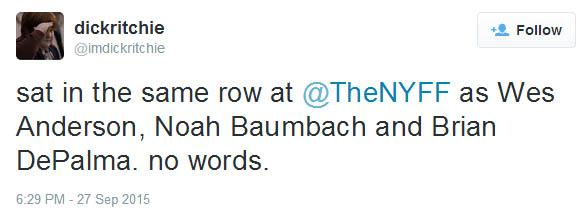
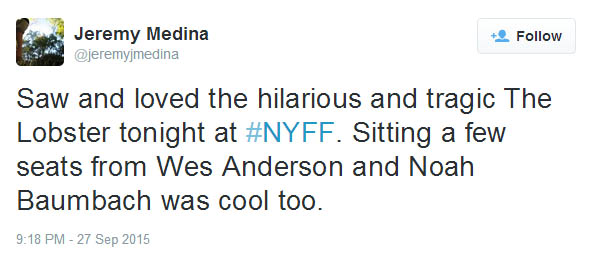
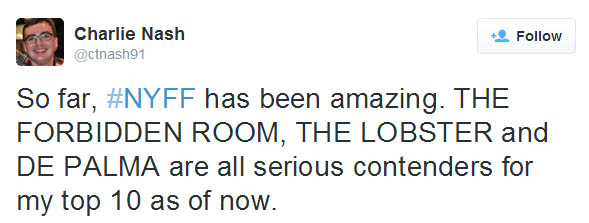

 In an article titled "13 Films to See at the New York Film Festival", posted yesterday at Vulture, David Edelstein recommends the De Palma documentary directed by Noah Baumbach and Jake Paltrow, which screens at the fest this Wednesday.
In an article titled "13 Films to See at the New York Film Festival", posted yesterday at Vulture, David Edelstein recommends the De Palma documentary directed by Noah Baumbach and Jake Paltrow, which screens at the fest this Wednesday.TOUMARKINE: 'DE PALMA' A REMINDER OF STUDIO MENTALITY & EGO SYSTEMS THAT KEEP HOLLYWOOD ROLLING
Meanwhile, Film Journal International's Doris Toumarkine also posted an anticipatory piece about the fest yesterday:
"NYFF documentaries this year are tantalizing, especially a good many focusing on show-biz subjects. Housed mainly in the “Spotlight on Documentaries” sector but scattered beyond are several new and intimate in-depth close-ups of film personalities. Among these winners, and for unexpected reasons, are Ingrid Bergman in Her Own Words, HBO’s Nora Ephron bio-doc Everything Is Copy, and filmmakers Noah Baumbach and Jake Paltrow’s De Palma, a talky, humorless sit-down with their pal Brian De Palma intercut with clips from his films and some he admires (the better part of this doc).As much as the Bergman and Ephron docs will be a joy to their admirers, the barreling look/listen blast of De Palma provides ammo to his detractors. Unexpectedly, the Bergman work—a trove of home movies (she loved cameras, hers and those of others), clips, and material from her letters and diaries (read by current Swedish-born star Alicia Vikander)—becomes an intimate exposé of what it really takes to be a great, enduring star. The De Palma close-up impresses as a reminder of the studio mentality and ego systems that keep Hollywood factories and their determined filmmakers rolling.
On the other hand, HBO’s portrait of the late writer/director/reporter Ephron is a celebration, not just of its beloved and no-nonsense subject, but of the talent, taste and intelligence that can sometimes bless mainstream product.
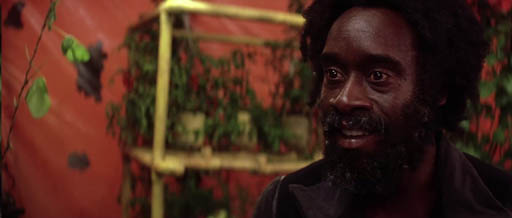
Scott orchestrates all of this like a pro. Two of his last three movies (Exodus: Gods and Kings and Prometheus) were so grand in scale that making this one probably wasn't a leap. He's workmanlike in his approach to science, which always trumps magic in The Martian — that's the point. But if we can't feel a sense of wonder at the magnitude and mystery of space, why even bother? In 3-D, at least, The Martian is handsome only in a perfunctory way: As with so many 3-D movies — Hugo and Gravity are exceptions — its hues look somewhat anemic and drained. (Stills from the film look brighter and richer, suggesting it might be best viewed in 2-D.) Even Mars's craggy landscape is less than vivid. Portions of the film were shot in Wadi Rum, in Jordan, but cinematographer Dariusz Wolski fails to make this desert landscape look otherworldly — the Death Valley of so many B westerns looks more mysterious and threatening.Or, flipping to a more recent reference, what about the satiny red sandscape of Brian De Palma's 2000 Mission to Mars, a half-dreamy, half-plausible effect achieved in part by cinematographer Stephen Burum's use of light reflectors made of copper sheeting? If I have to be stuck on Mars for any length of time, that's the one I want. The most affecting sequence in The Martian comes late, after Damon's Watney has been stranded on this dangerously semi-hospitable planet for such a very long time: His previously robust frame is bony. His face — that of a man who, even in his mid-forties, looks barely old enough to shave — has sprouted a rangy, mountain-man beard. Watney has refashioned himself as a space pirate. Finally, he's gone potty, but only just a little — he'll spring back to normal soon enough.
But for a few moments, he's a spiritual twin to Don Cheadle in Mission to Mars, another left-behind astronaut who managed to make stuff grow. By the time Cheadle's friends and colleagues finally rescue him, he has become the prisoner of a greenhouse that has also saved his life — it's enemy and sustenance at once. And even though he, like Watney, regains his sanity, there's a glimmer of madness in his eyes that will never fully dissipate. Mission to Mars was derided on its release, but there are few movies about space exploration as visually resplendent, or as delicately perched between mournfulness and optimism. And have we really reached the point where advanced special effects count for more than visual imagination? De Palma, himself a high school science fair winner, approached space as a mystery, a problem beautiful in its vast unsolvability. Scott, all about solutions, gives us the most seemingly authentic Mars money can buy. That doesn't make it the best.
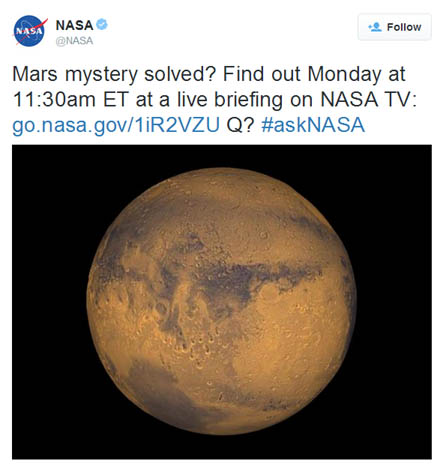
 The Hollywood Reporter's Gregg Kilday writes, "Brian De Palma is having a moment." Anticipating the upcoming screening of De Palma at the New York Film Festival, Kilday talked to NYFF director Kent Jones. "I remember the excitement I felt when I saw Dressed to Kill and Blow Out for the first time," Jones tells Kilday. "I went back to see both of them again a day later. During that time, there was a great debate about De Palma — he was hopelessly derivative of Hitchcock, he was a misogynist, he did sequences but not films, his stories didn't come together and so on. I fell into some of that punitive stuff myself."
The Hollywood Reporter's Gregg Kilday writes, "Brian De Palma is having a moment." Anticipating the upcoming screening of De Palma at the New York Film Festival, Kilday talked to NYFF director Kent Jones. "I remember the excitement I felt when I saw Dressed to Kill and Blow Out for the first time," Jones tells Kilday. "I went back to see both of them again a day later. During that time, there was a great debate about De Palma — he was hopelessly derivative of Hitchcock, he was a misogynist, he did sequences but not films, his stories didn't come together and so on. I fell into some of that punitive stuff myself."Kilday writes that after watching De Palma, Jones was persuaded to revisit sevveral of De Palma's films. "My sons and I looked at them together, and we were all absolutely stunned," Jones said to Kilday. "He was and is a great filmmaker, end of story."
Publicist: Could you talk a little bit about Mr. De Palma as a teacher? I’d describe him as one of the most generous directors I’ve ever had the pleasure of working with. I was a unit publicist for Carlito’s Way, and he didn’t say a word to me. But I never got kicked out of video village, anything I wanted to see I got to see, and it was the most amazing experience. I didn’t realize until watching this that… he’s a teacher. So could you talk a little bit about that?
Paltrow [nodding rigorously] : I really think that’s where the movie comes from. I think you sort of summed it up. That’s our experience of Brian, too, and that’s, exactly—not getting kicked out of video village… you know, virtually everybody would do that. I mean, that’s such a unique thing. And I bet you it’s not even conscious, he’s not distracted by that sort of thing. But that’s the core, I think, why we even made this in the first place.
Baumbach: Yeah, it’s interesting. I always knew about Home Movies, but in going through the timeline of his career, I guess I never quite thought, until we were doing the interviews and cutting the movie, is that he already had made Carrie and The Fury, and was now going to Sarah Lawrence and making this tiny movie with students and, you know, it’s so idiosyncratic. But as you know, Brian, as you point out, as you get to know him, it doesn’t actually seem out of line with the career—it actually seems very much in line with it. But it’s still… I don’t know any other filmmaker who’s done something like that.
MORE LINKS
"'The Hollywood system destroys creativity,' Brian De Palma tells us in Noah Baumbach and Jake Paltrow's documentary. That's not the first nor the last of the impassioned statements the director makes throughout the course of the film, which feels less like a retrospective and more like a cinephile confessional. 'It's in the same spirit as having coffee with him,' said Paltrow. That is, if you take your coffee blood red...
"Studio veteran influences aside, one of the most surprising revelations of De Palma is the extent of the director's stalwart low-budget conviction. 'What's the point of film school if kids don't learn how to create low-budget movies?' De Palma asks in the film. Clashes with studios, such as Columbia and Paramount, further highlight his commitment to his vision. But what stands out most is one of the most original films any low-budget guru has ever attempted... [In that last sentence, Buder is referring to Home Movies, as she then segues into the quotes from Baumbach talking about that film.]
"Throughout the film, De Palma speaks candidly of his confrontations with failure. Embedded within every film is a colony of mistakes, regrets and blunders De Palma is quick to detail. 'Your films are like a public record of things you didn't finish,' he says."
"In De Palma, the filmmaker makes no attempt to hide Hitchcock’s influence — in fact, it opens with him describing the formative experience of seeing Vertigo at Radio City Music Hall, something he says he 'will never forget.' If anything, De Palma seems confused that more of his contemporaries weren’t influenced in the same way, situating themselves similarly as 'practitioners' of the vocabulary Hitch perfected.
"The two filmmakers now also share the experience of walking through their careers with younger directors who idolize them, and De Palma has both the scope and specificity of the essential text Hitchcock/Truffaut, covering the entire career (even the movies we don’t really talk about) while pausing for in-depth explanations of the reasoning behind certain iconic shots, or the aesthetics of trademark techniques."
Anne-Katrin Titze, Eye For Film
"On the way out of the theatre, I told both of them that I was not the greatest De Palma fan, that I actually despised Passion, and that their documentary made me reconsider and curious to go back and re-watch a number of his films (not Passion, though). 'That's a good reaction to have,' Baumbach responded. Paltrow, when I brought up the great sense of completion due to the fact that they discuss all of his movies, confirmed that for them that was also a very important factor."
"Being a great admirer of Brian De Palma, I found that no film from 2015 was as purely pleasurable as Noah Baumbach and Jake Paltrow‘s De Palma, a blow-by-blow examination of the director’s massive oeuvre. Its structure is simple — De Palma speaks candidly about his upbringing, early efforts, and subsequent successes (as well as failures); many clips and archival materials are interspersed — but the effect to which their resources are wrung evinces a great deal of attention and care. In Baumbach’s own words, 'This is the only movie, probably, I can safely say, that I’ll be involved with that I can just keep watching over and over again. I find it so interesting.'
"After screening their work for press and industry members at this year’s New York Film Festival, the pair engaged in an Amy Taubin-led Q & A featuring audience questions. It’s hit-and-miss, as these things tend to be — I’ll pat myself on the back a little too strongly by noting that my own question, the very last, is the only one that seems to impress and stump both of these De Palma experts — but good insights are gathered throughout. My favorite part? When Baumbach explains the unexpected influence by saying, 'In a way, Brian, for me, sort of existed as what movies were awaiting me as a I got older. And then, once you start seeing them, they kind of go into your head and they don’t come out. I carry so many of those images over. The way I remember them, when I revisit them, I’m always surprised at how different they might be than the way I remembered them.'”
 Ryan Murphy directed the first hour of tonight's two-hour Scream Queens premiere on FOX. The premiere opens with a scene set in 1995, at a sorority house party. The first shot is a close-up on a girl's blood-soaked hands, the right one quivering. She holds them palms-up as she walks through a party crowd to her sorority sisters. When the head sister sees her, she says, "Did you just get your period all over yourself?" [Small SPOILER ALERT]..... It turns out that the blood belongs to a pledge who has just given birth in a bathtub upstairs. The kicker (and this is so very 1995) is that the girl didn't have any idea she had even been pregnant.
Ryan Murphy directed the first hour of tonight's two-hour Scream Queens premiere on FOX. The premiere opens with a scene set in 1995, at a sorority house party. The first shot is a close-up on a girl's blood-soaked hands, the right one quivering. She holds them palms-up as she walks through a party crowd to her sorority sisters. When the head sister sees her, she says, "Did you just get your period all over yourself?" [Small SPOILER ALERT]..... It turns out that the blood belongs to a pledge who has just given birth in a bathtub upstairs. The kicker (and this is so very 1995) is that the girl didn't have any idea she had even been pregnant.